Physical Address
30 N Gould St Ste N Sheridan, WY 82801
Physical Address
30 N Gould St Ste N Sheridan, WY 82801
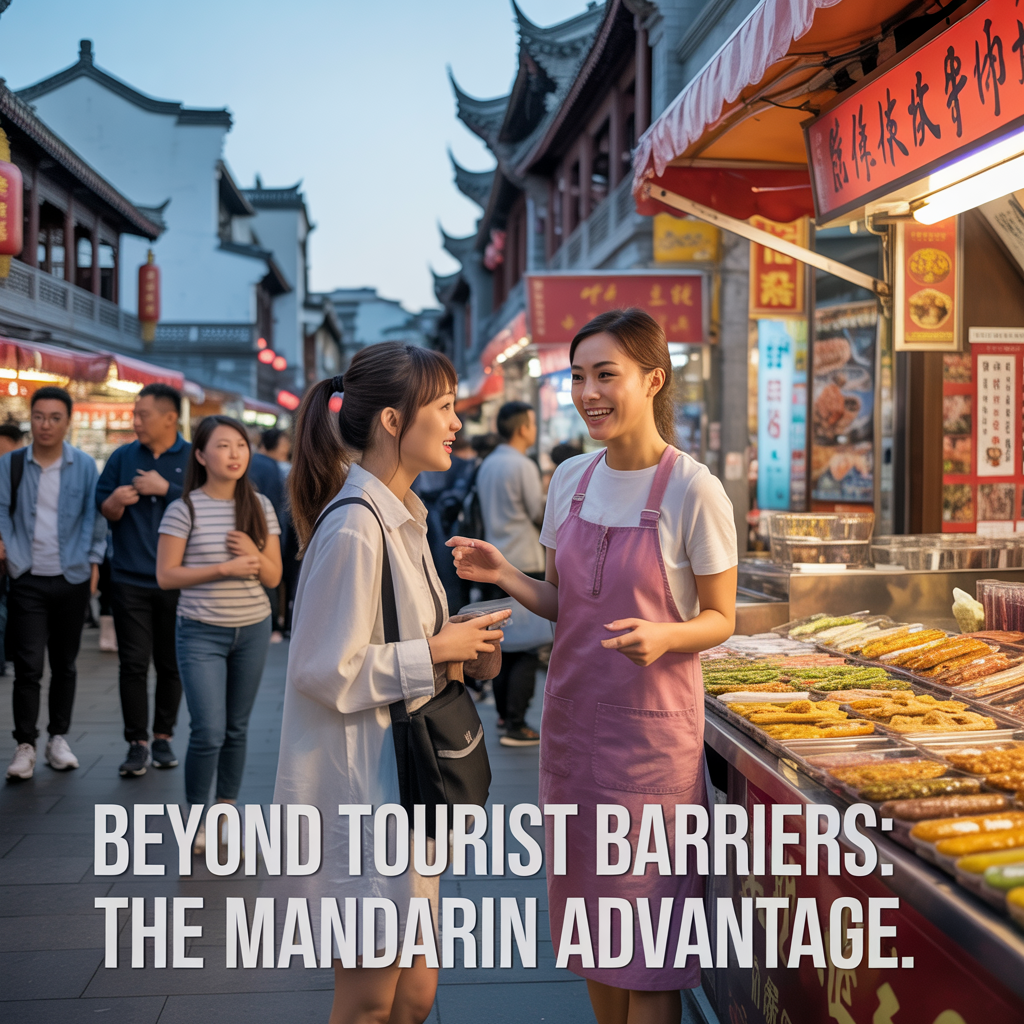

Ever stood in a busy Beijing market, desperately pointing at items while locals stare at you like you’re performing interpretive dance? Been there. The wall between you and authentic China isn’t just cultural—it’s linguistic, and speaking Mandarin will save the day.
Learning Mandarin before your 2025 China adventure isn’t just nice-to-have anymore—it’s the difference between being a tourist and becoming a temporary local. Speaking Mandarin will revolutionize your China travel experience in ways Google Translate never could.
I’ve watched travelers transform from confused outsiders to confident explorers just by mastering a few key phrases. The secret doors that open when you speak the language? Absolutely game-changing.
But here’s what nobody tells you about learning Mandarin for travel—the conventional methods most tourists try first are exactly why they fail.

Picture this: You’re wandering through a bustling food market in Chengdu. The aromas are incredible, but you’re stuck pointing at food like a confused toddler. Now imagine confidently asking the vendor about that mysterious steaming bun. Her face lights up. She explains it’s her grandmother’s recipe and throws in an extra one for free.
That’s the difference Mandarin makes. Even basic phrases crack open doors that remain firmly shut to non-speakers. Chinese people don’t expect foreigners to speak their language, so when you do—even imperfectly—you’ve instantly separated yourself from the tourist herd.
The real China exists beyond the Great Wall and Forbidden City. It’s in tiny family restaurants without English menus, local festivals never mentioned in guidebooks, and hidden scenic spots that locals treasure.
Speaking Mandarin gives you the golden key to these experiences. That roadside stall where workers line up at lunch? That’s where the best noodles in town are. The unmarked door that locals keep disappearing into? That’s a secret tea house with century-old traditions.
Without Mandarin, you’re limited to the sanitized tourist version of China. With it, you step through the looking glass into authentic daily life.
Chinese culture deeply values personal connection. Speaking Mandarin transforms you from “random foreigner” to “interesting person worth knowing.”
When I started speaking Mandarin in Shanghai, my landlady went from polite nods to inviting me to family dinners. My barber started sharing neighborhood gossip. The fruit seller began saving the best mangoes for me.
These aren’t just convenient friendships—they’re genuine human connections that enrich your experience immeasurably. Chinese people are incredibly loyal friends once you break through the initial language barrier.
There’s a parallel universe of events happening in every Chinese city that you’ll never find on English websites or tourist apps.
Underground music performances in converted factories. Pop-up art installations in historic neighborhoods. Seasonal food festivals where grandmas compete for the best dumplings. Traditional holiday celebrations in local communities.
Speaking Mandarin means locals will tell you, “Don’t go to that touristy place—come to this neighborhood celebration instead.” You’ll get invited to birthday parties, wedding banquets, and family gatherings that offer authentic glimpses into Chinese life no tour could ever provide.
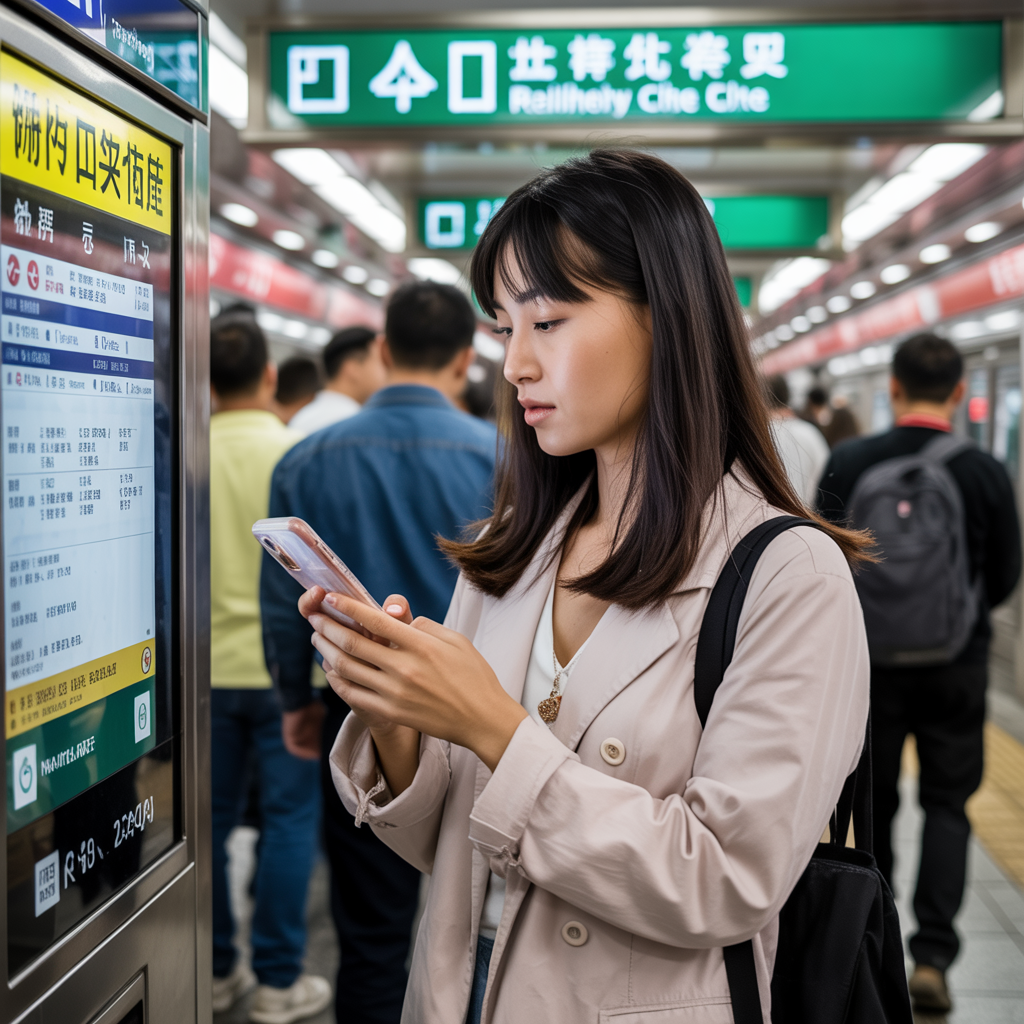
Ever stared at a Chinese subway map feeling like you’re trying to crack some ancient code? Been there. Without Mandarin skills, those colorful lines and characters might as well be hieroglyphics.
With basic Mandarin, you’ll spot patterns in station names. “北” (běi) means north, “南” (nán) means south. See “站” (zhàn)? That’s “station.” Suddenly those intimidating signs make sense.
Chinese transit apps like Baidu Maps and Gaode work brilliantly—but their English versions? Not so much. Speaking Mandarin lets you ask a local, “这个站牌什么意思?” (What does this sign mean?) and actually understand the answer.
The dreaded “tourist tax” hits hardest when you can’t speak the language. Taxi drivers in China can smell language barriers from a mile away.
When you can confidently say “请打表” (qǐng dǎ biǎo – please use the meter) or “太贵了” (tài guì le – too expensive), drivers know they can’t pull a fast one on you.
Real talk: I saved over 200 yuan on a single airport transfer just by negotiating in Mandarin. The initial “special price” magically dropped by 60% when I switched from English to Chinese.
We’ve all been there—standing in some alley where your GPS signal decided to peace out.
With Mandarin, you can ask simple questions like “地铁站在哪里?” (Where is the subway station?) or “怎么走到长城?” (How do I get to the Great Wall?).
The best directions often come from locals who know shortcuts no app will show you. That grandpa playing chess in the park? He might tell you about the hole-in-the-wall restaurant serving the best dumplings you’ll ever taste—but only if you can understand him.
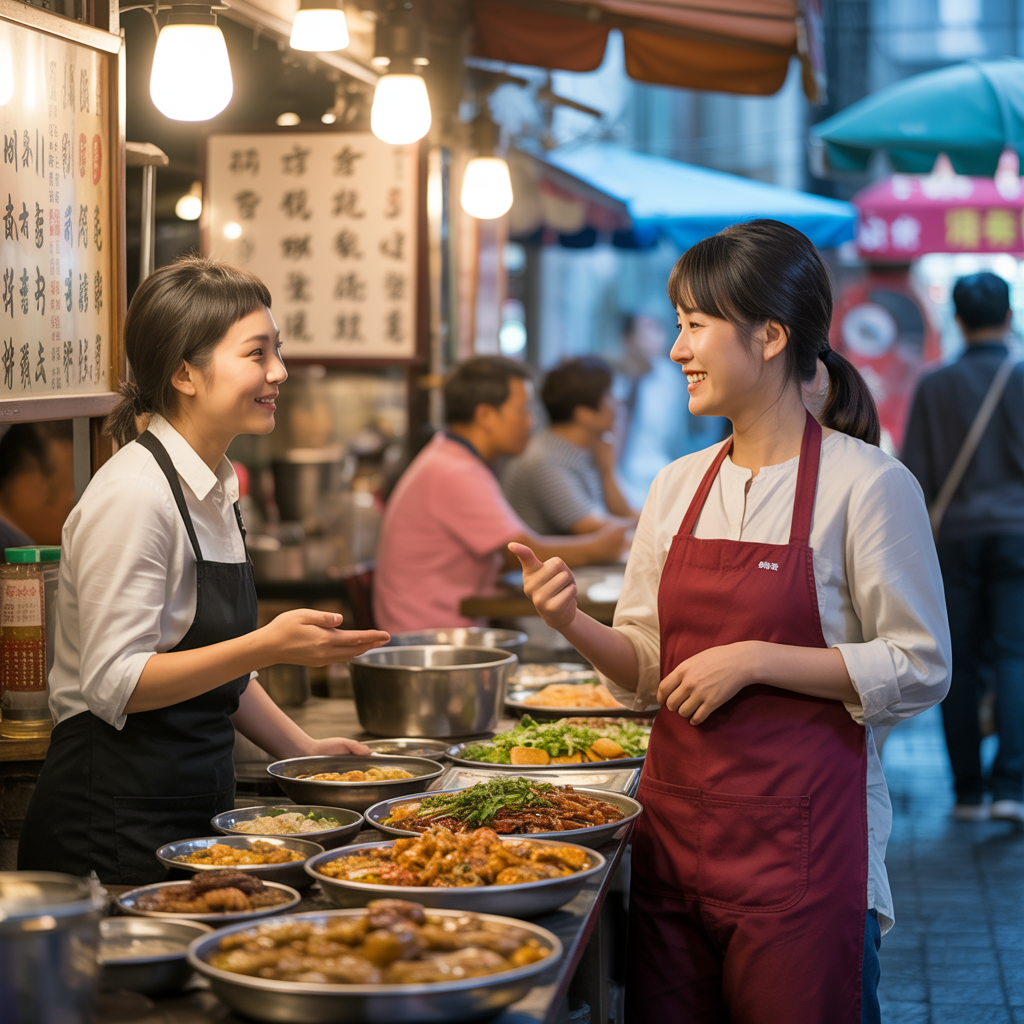
Ever noticed those Chinese-only menu pages? That’s where the good stuff hides. With basic Mandarin, you can ask “这个特别好吃吗?” (Is this especially delicious?) and watch doors open.
I once stumbled through ordering “hongshao rou” in Shanghai, and the waitress’s face lit up. She brought the chef out who personally explained his family’s 30-year-old recipe for this braised pork belly dish.
Most tourists get stuck with the same westernized dishes while missing regional treasures like:
Knowing phrases like “微辣” (mildly spicy) or “清蒸” (steamed) transforms your ordering experience.
Chinese cuisine isn’t just about what you eat but how it’s prepared. When you can discuss cooking methods, you’ll appreciate why a dish from Sichuan tastes completely different from its Cantonese cousin.
I watched a tourist frantically fanning his mouth after assuming all tofu dishes were mild. A simple “这个辣吗?” (Is this spicy?) would have saved him.
“不要放MSG” won’t cut it if you have dietary restrictions. You need specific vocabulary.
When my vegetarian friend visited, saying “我吃素的” (I’m vegetarian) wasn’t enough. We learned “没有肉, 没有海鲜, 没有鱼” (no meat, no seafood, no fish) and suddenly vegetarian options appeared that weren’t on any menu.
Religious restrictions? Medical conditions? Allergies? Without Mandarin, you’re gambling with each meal.
The holy grail of authentic food experiences comes through connections.
My basic Mandarin conversation with a market vendor in Yunnan led to an invitation to her family’s New Year dinner. The dishes weren’t in any guidebook – her grandmother’s special recipes passed down generations.
These invitations rarely happen to non-Mandarin speakers. When locals realize you’ve made the effort to learn their language, they’re proud to share their culinary heritage.
Small talk about food opens doors to kitchens across China. Just learning to sincerely compliment a dish with “太好吃了!” (so delicious!) can create friendship and unlock experiences money can’t buy.
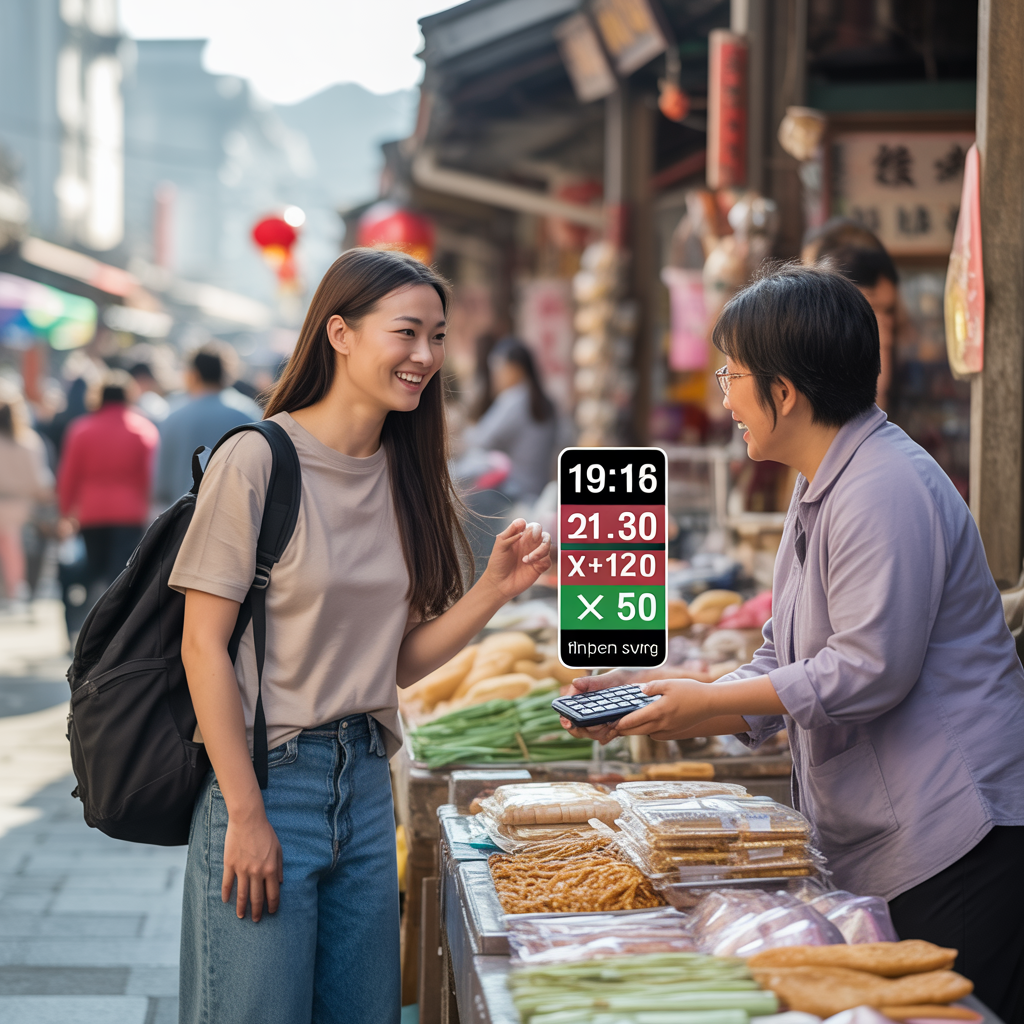
Ever paid triple what locals do for that “authentic” souvenir? Happens all the time. But with even basic Mandarin phrases, you’ll slash those inflated tourist prices instantly.
“Tai gui le” (too expensive) followed by “Ke yi pian yi yidian ma?” (Can it be cheaper?) works magic. I watched a friend save 200 yuan on a tea set just by counting in Mandarin during negotiations. The seller’s shock was priceless.
Vendors respect effort. They’re not just selling—they’re sizing you up. Speaking their language shifts the power dynamic dramatically.
The infamous “foreigner tax” is real, folks. Two-tier pricing systems exist everywhere from restaurants to attractions.
When you order in Mandarin, menus with local prices suddenly appear. A hostel owner in Chengdu told me they automatically direct Mandarin-speakers to cheaper room options that never make it to English booking sites.
Some examples I’ve documented:
| Experience | Tourist Price | Local Price (with Mandarin) |
|---|---|---|
| Yangshuo boat ride | ¥350 | ¥120 |
| Street food dinner | ¥85 | ¥30 |
| Museum entrance | ¥120 | ¥60 (or free on certain days) |
The absolute best deals never make it to Western booking platforms. Period.
Chinese budget chains like Home Inn and 7Days offer rooms at half what you’d pay at international brands. But their websites? Chinese-only.
Small family-run guesthouses—where rooms can go for ¥80-150 per night—often don’t speak English. With basic Mandarin, you’ll unlock these hidden gems and the authentic local experience that comes with them.
In smaller cities, simply asking locals “Zài nǎlǐ kěyǐ zhù de piányi?” (Where can I stay cheaply?) has led me to comfortable rooms at unbelievable prices.
Museums, parks, and cultural centers frequently offer free admission days or student discounts that aren’t advertised in English.
Temple performances, community tai chi sessions, and local festivals—all free and incredibly enriching—remain hidden to non-Mandarin speakers. I’ve joined cooking classes for ¥30 that would cost ¥300 through English-language tour groups.
City libraries often host cultural events at minimal cost, but you’d never know without reading Chinese notices or asking in Mandarin.
The secret weapon of budget travelers in China? Apps like Meituan, Dianping, and Pinduoduo.
These platforms offer mind-blowing discounts—we’re talking 50-70% off everything from meals to massages to movie tickets. But they’re exclusively in Chinese.
I scored a hot pot feast for four at just ¥99 that would’ve been ¥350+ without the Meituan voucher. A friend booked a clean hotel room for ¥119 instead of the walk-in price of ¥399.
Even basic Mandarin reading skills let you navigate these apps with translation tools, unlocking a parallel economy that most foreigners never access.

Ever tried ordering food with just pointing and smiling? Yeah, it works… kinda. But speak a little Mandarin, and suddenly you’re not just getting food—you’re getting stories.
I remember chatting with a noodle vendor in Chengdu who laughed when I used the proper Mandarin term for his specialty. “Only locals know that word!” he said, before giving me an extra portion. That’s the magic of language.
When you speak even basic Mandarin, shopkeepers stop seeing you as a walking wallet. They see someone who cares enough to try. Prices sometimes magically drop. Recommendations appear. Real conversations happen.
Those subtle head nods, the concept of “face,” the indirect ways of saying no—these aren’t just quirks, they’re cultural foundations you’ll only truly grasp through language.
Picture yourself at Spring Festival, not just watching the celebrations but understanding the “gong xi fa cai” greetings and why those red envelopes matter so much.
Knowing Mandarin transforms you from spectator to participant. During the Dragon Boat Festival, locals might invite you to join their team when they hear you ask about the sticky rice dumplings in their native tongue.
In smaller towns especially, traditional tea ceremonies, ancestral worship rituals, and neighborhood gatherings become accessible when you can communicate. Suddenly, that private family celebration becomes an invitation when they hear you speaking their language.
The Forbidden City is impressive regardless of what language you speak. But when you understand that “Tian’anmen” means “Gate of Heavenly Peace,” the significance deepens instantly.
Tour guides typically offer the simplified version to English-speaking groups. Speak Mandarin, though, and you unlock the detailed stories—the imperial intrigues, the symbolic meanings behind architectural features, the poetic inscriptions on ancient stones.
Reading the original calligraphy at historical sites connects you directly to China’s literary tradition. Those four-character idioms carved into temple walls tell stories that simply don’t translate well.
China’s tourist sites aren’t just beautiful places—they’re chapters in a 5,000-year story. Speaking Mandarin gives you the key to read that story as it was meant to be told.
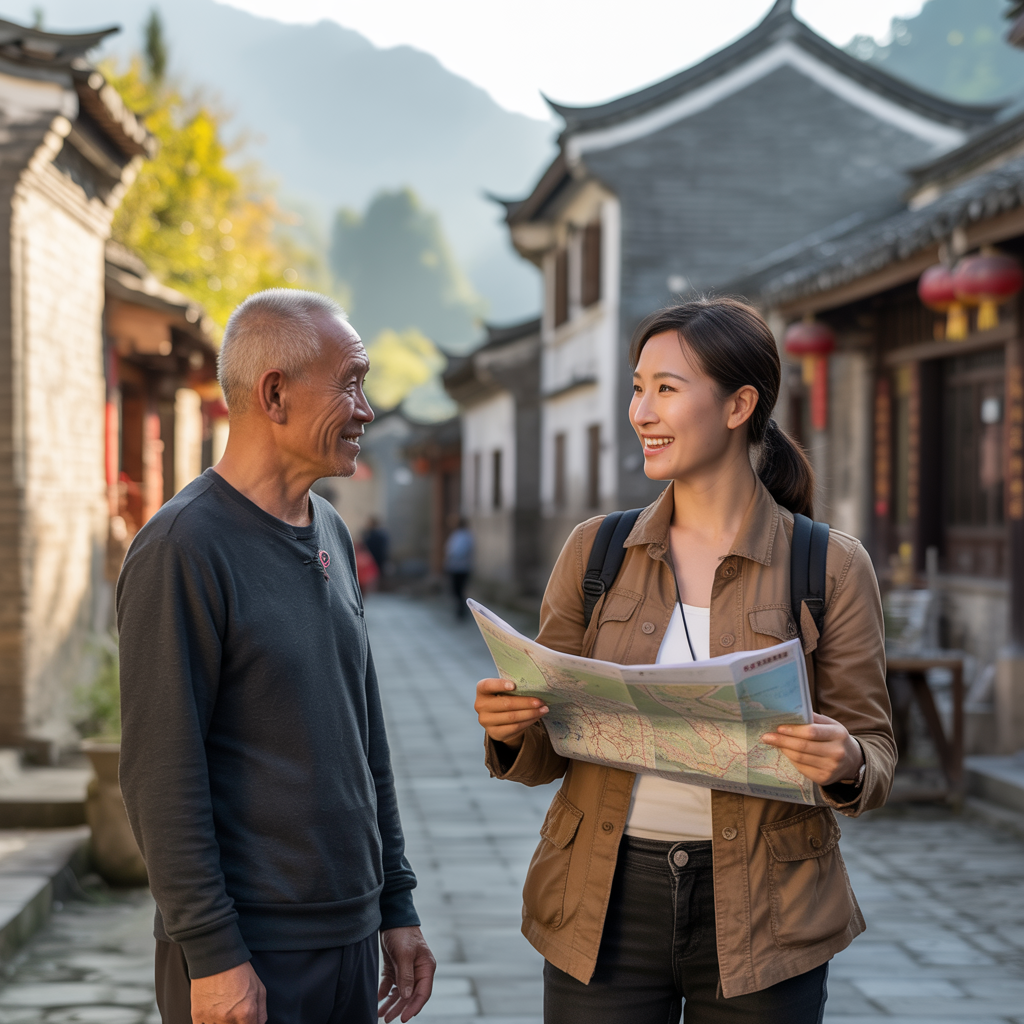
Ever wandered into a tiny Chinese village where the last English speaker passed through maybe… never? That’s where the magic happens.
I once stumbled into a mountain hamlet in Yunnan where my phrase book failed me completely. But with my basic Mandarin? I ended up drinking homemade rice wine with three generations of farmers who couldn’t stop laughing at my tones.
Speaking even elementary Mandarin in rural China isn’t just helpful—it’s transformative. Villagers light up when you attempt their language. Suddenly you’re not just another tourist but an honored guest.
Picture yourself:
China has over 160 cities with populations exceeding one million, and most tourists see maybe three of them. The rest? They’re yours to explore when you speak Mandarin.
In places like Changsha, Harbin, or Xiamen, English signage often disappears. Bus routes, street food stalls, and hotel check-ins all happen in Chinese. With basic Mandarin skills, you transform from lost tourist to confident explorer.
A few phrases unlock entire cities:
The ultimate travel currency isn’t yuan—it’s local recommendations. And these come primarily through conversations in Mandarin.
That unmarked door leading to the best dumpling shop in town? The weekend market where locals actually shop? The stunning viewpoint that somehow missed Instagram fame? None appear on English apps.
When you chat with locals in Mandarin, they’ll often share their personal favorites—places they take their own families. I’ve been guided to ancestral temples tucked behind apartment blocks, invited to family celebrations, and shown secret hiking trails—all through casual Mandarin conversations with taxi drivers, shopkeepers, and people sitting next to me on trains.
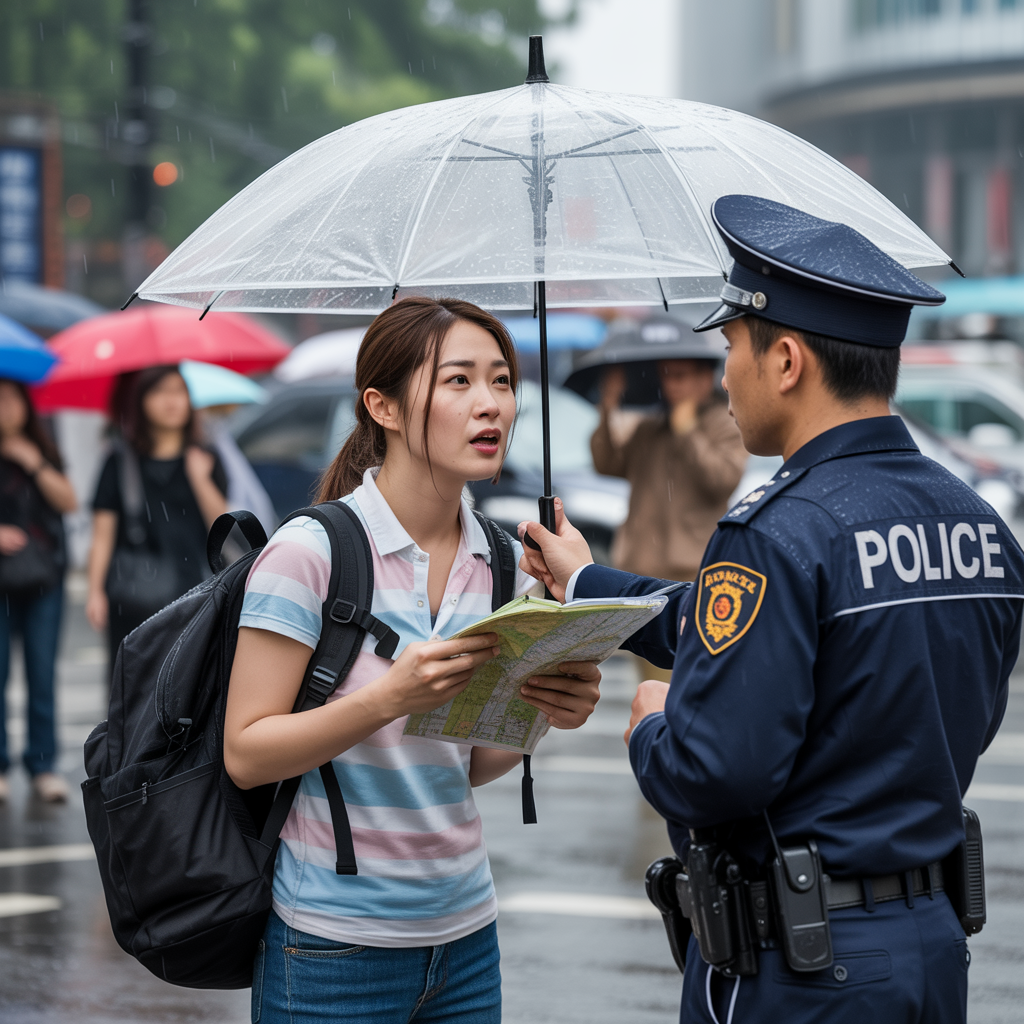
Ever been sick in a foreign country? It’s scary enough without a language barrier.
Picture this: you wake up with a fever in your Beijing hotel. With basic Mandarin, you can explain symptoms to a doctor without playing an exhausting game of charades. You’ll know phrases like “tóu téng” (headache) or “wǒ xū yào yào” (I need medicine).
The difference between saying “allergic to penicillin” and not could literally save your life. Medical staff immediately understand your condition rather than waiting for a translator while precious minutes tick by.
Lost your passport in Shanghai? Don’t panic.
Hotel staff often have limited English skills, especially in smaller cities. When you can explain “wǒ de hù zhào diū le” (I lost my passport) and describe where you last saw it, you’ll get help faster.
One traveler I know recovered an expensive camera because she could describe it in Mandarin, while her non-speaking friend spent days trying to locate a lost bag through frustrating translation apps.
Train canceled due to weather? Flight delayed?
These situations happen to everyone, but speaking Mandarin lets you pivot quickly. You can understand announcements in real-time instead of waiting for English updates (which might never come).
You’ll confidently approach counter staff saying “wǒ xū yào gǎi piào” (I need to change my ticket) and actually understand the alternatives they offer.
The truly unexpected moments are where Mandarin shines brightest.
Maybe your wallet gets stolen, you miss the last bus from a remote village, or you need to find a specific medication at night. These aren’t situations where translation apps work well.
Speaking even basic Mandarin means you can ask any local for help – not just those who speak English. The ability to explain your situation clearly to police, random shopkeepers, or kind strangers multiplies your support network exponentially.

Business in China runs on relationships. Speaking Mandarin instantly transforms you from “that foreign business person” to someone worth connecting with.
I’ve seen it countless times – the moment you greet a potential Chinese partner in their language, their face lights up. That barrier? Gone. You’ve just skipped three meetings’ worth of relationship-building in ten seconds.
Think about it. When everyone else is fumbling with translators or speaking slowly in English, you’re chatting directly. You pick up on subtle cues, understand the hesitations, and know when “maybe” actually means “no.”
One American tech executive I know closed a major deal simply because she could discuss contract details in Mandarin over dinner. While her competitors were still scheduling follow-up meetings with interpreters, she was already signing paperwork.
Chinese business culture isn’t just about what’s said—it’s how it’s said.
Mandarin speakers grasp the crucial distinction between “给面子” (giving face) and “失面子” (losing face). These concepts shape every business interaction in China, but they’re nearly impossible to fully understand without speaking the language.
When you know Mandarin, you’ll recognize why:
One British consultant told me she avoided a disastrous mistake when negotiating simply because she understood her Chinese counterpart was using polite language to signal problems with the proposal. Her non-Mandarin-speaking colleagues missed these signals completely.
Speaking Mandarin opens doors to genuine connections beyond the conference room.
Business dinners in China aren’t just meals—they’re relationship-building rituals. When you can toast in Mandarin, discuss regional cuisines, and share stories without a translator, you’re building trust that translates to business success.
Your language skills signal commitment. They show you’ve invested time in understanding not just the market, but the people. That effort rarely goes unnoticed or unrewarded.
A German executive I interviewed credits his Mandarin skills for his company’s expansion success. “When I could joke with suppliers in their language, discuss their children’s education, or comment on local sports teams, they stopped seeing us as just another foreign company looking to profit. We became partners with shared goals.”
The language provides context for understanding why decisions are made, how hierarchy functions, and what motivates your Chinese counterparts on a deeper level.

Ever watched those viral TikToks of foreigners speaking fluent Mandarin? They rack up millions of views because viewers love authentic cultural connections.
When you speak Mandarin during your China travels, you’re not just another tourist – you’re someone who can share genuine cultural insights that ordinary travelers miss.
Imagine capturing a conversation with a local tea master explaining century-old brewing techniques in his native tongue. Or recording yourself bargaining in a hidden market where tourists never venture. That’s content gold.
The secret? Chinese viewers instantly recognize when someone respects their culture enough to learn their language. They’ll comment, share, and boost your content far beyond what typical tourist posts achieve.
Forget Instagram for a minute. The real engagement happens on Xiaohongshu (Little Red Book), Douyin (Chinese TikTok), and WeChat.
Speaking Mandarin unlocks these platforms where billions of Chinese users hang out. Even basic Mandarin lets you:
I’ve seen Western travelers with modest followings on Instagram suddenly blow up on Douyin simply because they could title their videos in Mandarin and interact with commenters.
People follow authentic voices. When you speak Mandarin, you attract followers who value genuine cultural exchange over surface-level tourism content.
Your audience becomes a community of:
The magic happens when you can bridge worlds. A simple video of you explaining your hometown’s traditions in Mandarin or comparing Chinese and Western customs creates meaningful connections that shallow travel content never could.
Your Mandarin skills open doors to partnerships impossible for non-speakers.
Chinese businesses are increasingly looking for authentic ways to reach international audiences. When you can communicate directly with potential partners in their language, you jump to the front of the collaboration line.
Local influencers love working with foreigners who speak their language because it creates fresh, engaging content their audiences rarely see. These collaborations exponentially grow your following.
Even small businesses – from family-run restaurants to traditional craftspeople – become potential content partners when language barriers disappear. These authentic collabs perform dramatically better than obvious tourist promotions.

Ever tried ordering food in a language you barely speak? That first “Wǒ yào zhège” (I want this) might feel clumsy, but the smile you get when understood? Pure gold.
Learning Mandarin for your China trip isn’t just about vocabulary—it’s about stepping outside your comfort zone repeatedly. Each successful interaction builds your confidence muscle. That street vendor who compliments your tones? The hotel receptionist who switches from English to chat with you in Mandarin? These moments transform you.
I’ve seen timid travelers become bold adventurers after just a week of practicing their Mandarin daily. The confidence you build doesn’t stay in China—it follows you home.
Mandarin rewires your brain—literally. When you switch between character-based and alphabet-based languages, your brain creates new neural pathways.
Picture this: You’re trying to find your hostel in a Beijing hutong. Your map app quits. Now you’re crafting questions in Mandarin, interpreting directions, and processing cultural cues simultaneously. That mental juggling act? It’s cognitive flexibility in action.
Travelers who learn Mandarin consistently report improved:
The real magic happens when language breaks down walls.
That elderly man who invited you for tea after you asked about his calligraphy in broken Mandarin? He shared stories about Cultural Revolution that no guidebook contains. The family who welcomed you to their New Year celebration because you could exchange basic pleasantries? They became your Chinese family.
Speaking even basic Mandarin transforms superficial tourist experiences into deeply personal memories. These genuine human connections become the stories you’ll tell for decades.
Tourists take pictures. Locals know the rhythm of daily life.
Speaking Mandarin helps you slide into that second category. You’ll find yourself:
When you order at the hole-in-the-wall noodle shop where no English is spoken, when the fruit seller recognizes you and practices numbers in English while you practice in Mandarin—you’ve crossed an invisible line. You’re not just visiting China anymore. For this brief, beautiful moment, you’re living it.
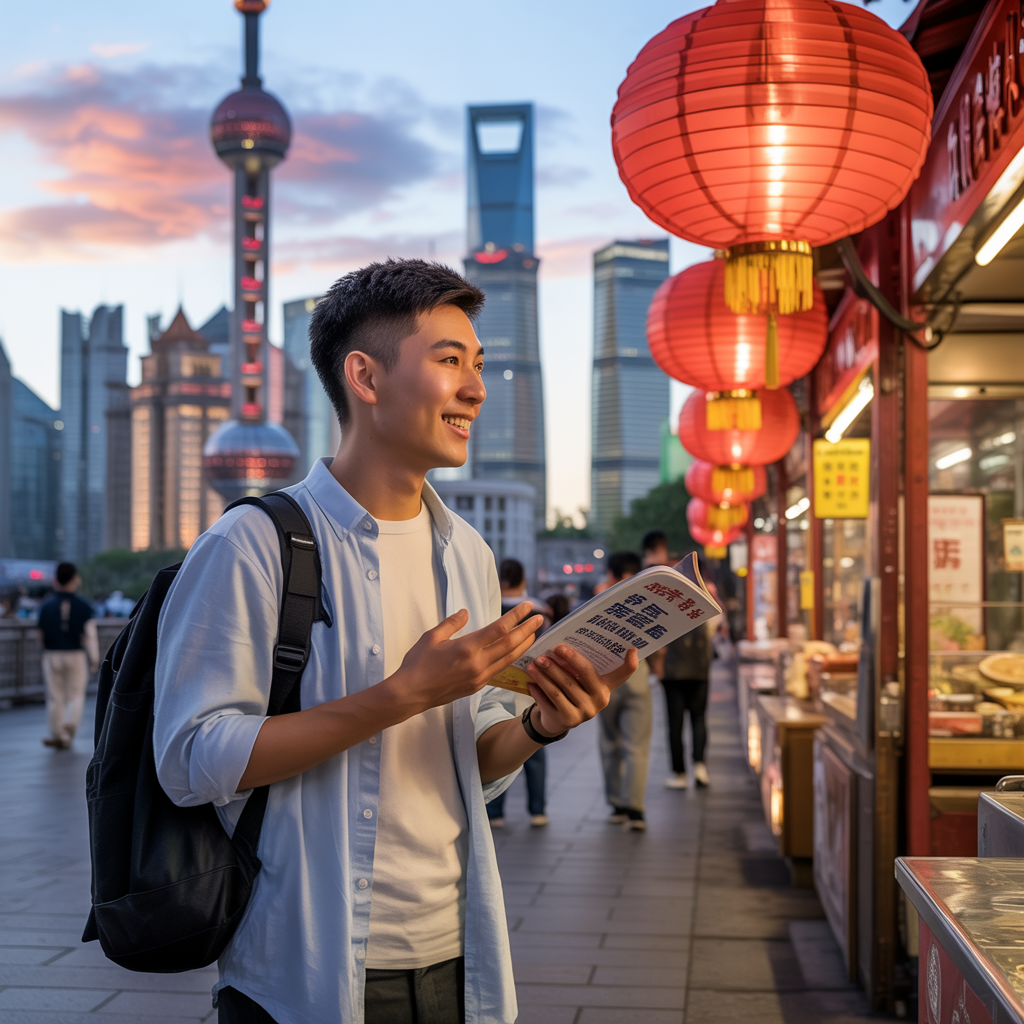
Mastering Mandarin transforms your China travel experience from ordinary to extraordinary. By speaking the local language, you’ll forge meaningful connections with residents, confidently navigate transportation systems, and discover authentic culinary delights that most tourists miss. Your linguistic skills will not only save you money and enhance cultural immersion but also empower you to explore hidden gems across China while handling unexpected situations with confidence. For business travelers, speaking Mandarin opens doors to valuable networking and opportunities.
Make 2025 the year you revolutionize your China adventure through language learning. The rewards extend beyond practical benefits—Mandarin proficiency offers personal growth through overcoming linguistic challenges and the satisfaction of authentic cultural engagement. Whether you’re planning your first visit or returning to explore more deeply, investing in even basic Mandarin skills will create a richer, more memorable journey through this fascinating country. Start learning today, and prepare for an unparalleled China experience.